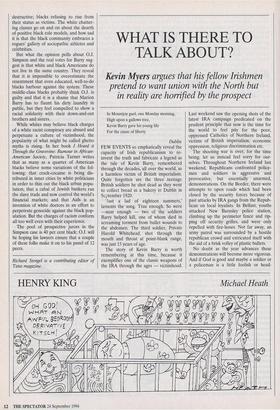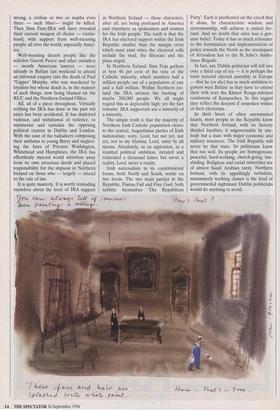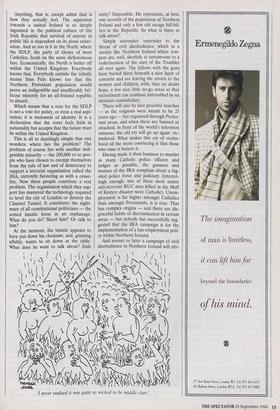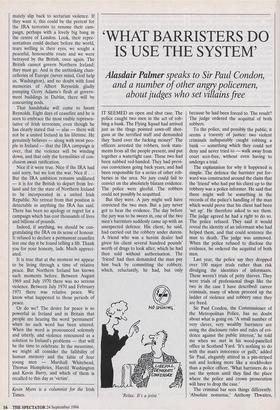WHAT IS THERE TO TALK ABOUT?
Kevin Myers argues that his fellow Irishmen
pretend to want union with the North but in reality are horrified by the prospect
In Mountjoy gaol, one Monday morning, High upon a gallows tree, Kevin Barry gave his young life For the cause of liberty Dublin FEW EVENTS so emphatically reveal the capacity of Irish republicanism to re- invent the truth and fabricate a legend as the tale of Kevin Barry, remembered through the decades, all over the world, as a harmless victim of British imperialism. Quite forgotten are the three .teenage British soldiers he shot dead as they went to collect bread in a bakery in Dublin in September 1920.
`Just a lad of eighteen summers,' laments the song. True enough. So were —near enough — two of the soldiers Barry helped kill, one of whom died in screaming torment from bullet wounds to the abdomen. The third soldier, Private Harold Whitehead, shot through the mouth and throat at point-blank range, was just 15 years of age.
The story of Kevin Barry is worth remembering at this time, because it exemplifies one of the classic weapons of the IRA through the ages — victimhood. Last weekend saw the opening shots of the latest IRA campaign predicated on the prudent principle that now is the time for the world to feel pity for the poor, oppressed Catholics of Northern Ireland, victims of British imperialism, economic oppression, religious discrimination etc.
The shooting war is over, for the time being; let us instead feel sorry for our- selves. Throughout Northern Ireland last weekend, Republicans confronted police- men and soldiers in aggressive and provocative, but essentially unarmed, demonstrations. On the Border, there were attempts to open roads which had been closed by the security forces because of past attacks by IRA gangs from the Repub- lican on local loyalists. In Belfast, youths attacked New Barnsley police station, climbing up the perimeter fence and rip- ping off security grilles, and were only repelled with fire-hoses. Not far away, an army patrol was surrounded by a hostile republican crowd and extricated itself with the aid of a brisk volley of plastic bullets.
No doubt as the year advances these demonstrations will become more vigorous. And if God is good and maybe a soldier or a policeman is a little foolish or head- strong, a civilian or two or maybe even three — such bliss!— might be killed. Then Sinn Fein-IRA will have revealed their current weapon of choice — victim- hood, with support from well-meaning people all over the world, especially Amer- ica.
Well-meaning decent people like the solicitor Gareth Peirce and other outsiders — mostly American lawyers — were already in Belfast last weekend to attend an informal enquiry into the death of Paul `Topper' Murphy, who was murdered by loyalists but whose death is, in the manner of such things, now being blamed on the RUC and the Northern Ireland Office.
All, all of a piece throughout. Virtually nothing the IRA has done in the past ten years has been accidental. It has deployed violence, and withdrawal of violence, to mesmerise and tantalise the opposing political centres in Dublin and London. With the ease of the balladeers composing their anthems to young Barry and neglect- ing the fates of Privates Washington, Whitehead and Humphries, the IRA has effortlessly steered world attention away from its own atrocious deeds and placed responsibility for the impasse in Northern Ireland on those who — largely — attend to the rule of law.
It is quite masterly. It is worth reminding ourselves about the level of IRA support in Northern Ireland — these characters, after all, are being portrayed in America and elsewhere as spokesmen and women for the Irish people. The truth is that the IRA has electoral support within the Irish Republic smaller than the margin error which must exist when the electoral rolls include the mad, the illiterate and the plain stupid.
In Northern Ireland, Sinn Fein gathers at best 40 per cent of the vote of the Catholic minority, which numbers half a million people out of a population of one and a half million. Within Northern Ire- land the IRA attracts the backing of maybe 200,000 people. We all might regard this as deplorably high; yet the fact remains: IRA supporters are a minority of a minority.
The simple truth is that the majority of Northern Irish Catholic population cleave to the central, Augustinian pieties of Irish nationalism; unity, Lord, but not yet, not yet, not in my lifetime, Lord, unity by all means. Absolutely, as an aspiration, as a vaunted political ambition, iterated and reiterated a thousand times; but never a reality, Lord, never a reality.
Irish nationalism in its constitutional forms, both North and South, works on two levels. The two main parties in the Republic, Fianna Fail and Fine Gael, both subtitle themselves 'The Republican Party'. Each is predicated on the creed that it alone, by characteristic wisdom and statesmanship, will achieve a united Ire- land. And no doubt that once was a gen- uine belief. Today it has as much relevance to the formulation and implementation of policy towards the North as the reconquest of Jerusalem has to the St John's Ambu- lance Brigade, In fact, any Dublin politician will tell you over a third cup of tea — it is perhaps the most teetotal elected assembly in Europe — that he (or she) has as much ambition to govern west Belfast as they have to extend their writ over the Khmer Rouge-infested rainforests of Kampuchea. In this regard they reflect the deepest if unspoken wishes of their electorate.
In their heart of often unexamined hearts, most people in the Republic know that Northern Ireland, with its fiercely divided loyalties, is ungovernable by any- body but a state with major economic and military resources. The Irish Republic will never be that state. Its politicians know that too well. Its people are homogenous, peaceful, hard-working, church-going, law- abiding. Religious and racial minorities are of almost Saudi Arabian rarity. Northern Ireland, with its appallingly turbulent, unmannerly working classes is the kind of governmental nightmare Dublin politicians would do anything to avoid. Anything, that is, except admit that is how they actually feel. The aspiration towards a united Ireland is so deeply ingrained in the political culture of the Irish Republic that survival of anyone in public life is dependent on its pious reiter- ation. And so too is it in the North, where the SDLP, the party of choice of most Catholics, feeds on the same dichotomous fare. Economically, the North is better off within the United Kingdom. Everybody knows that. Everybody outside the tribally insane Sinn Fein knows too that the Northern Protestant population would prove an indigestible and insufferably bel- licose minority for an all-Ireland republic to absorb.
Which means that a vote for the SDLP is not a vote for policy, or even a real aspi- ration; it is statement of identity. It is a declaration that the voter feels Irish in nationality but accepts that the future must lie within the United Kingdom.
This is all so dazzlingly simple that one wonders: where lies the problem? The problem of course lies with another indi- gestible minority — the 200,000 or so peo- ple who have chosen to exempt themselves from the rule of law and of democracy to support a terrorist organisation called the IRA, currently favouring us with a cease- fire. Now these people constitute a real problem. The organisation which they sup- port has mastered the technology required to level the city of London or destroy the Channel Tunnel. It constitutes the night- mare of all constitutional politicians — the armed lunatic loose in an orphanage. What do you do? Shoot him? Or talk to him?
At the moment, the lunatic appears to have put down his chainsaw, and, grinning affably, wants to sit down at the table. What does he want to talk about? Irish unity? Impossible. He represents, at best, one seventh of the population of Northern Ireland and only a few old savage hill-bil- lies in the Repuhlic. So what is there to talk about?
Simply surrender: surrender to the threat of civil disobedience, which in a society like Northern Ireland where tem- pers are, well, shortish, is tantamount to a redeclaration of the start of the Troubles all over again. The fellows with the guns have buried them beneath a nice layer of concrete and are leaving the streets to the women and children, with, they no doubt hope, a few nice little no-go areas so that recruitment can continue untroubled by an intrusive constabulary.
There will also be nice peaceful marches — as the originals were meant to be 25 years ago — but organised through Protes- tant areas, and when these are banned or attacked, in front of the world's television cameras, the old cry will go up again: vic- timhood. What makes this cry of victim- hood all the more convincing is that those who raise it believe it.
Having made it their business to murder as many Catholic police officers and judges as possible, the gunmen and women of the IRA complain about a big- oted police force and judiciary (interest- ingly enough, two of three most senior anti-terrorist RUC men killed in the Mull of Kintyre disaster were Catholic). Unem- ployment is far higher amongst Catholics than amongst Protestants, it is true. That has complex origins — and there are dis- graceful habits of discrimination in certain areas — but nobody has successfully sug- gested that the IRA campaign is for the implementation of a fair-employment poli- cy within Northern Ireland.
And sooner or later a campaign of civil disobedience in Northern Ireland will ulti- 'I never realised it was quite so wicked to be middle class.'
mately slip back to sectarian violence. If they want it, this could be the pretext for the IRA terrorists to resume their cam- paign, perhaps with a lovely big bang in the centre of London. Look, their repre- sentatives could declare before the world, tears welling in their eyes, we sought a peaceful, honourable route and we were betrayed by the British, once again. The British cannot govern Northern Ireland: they must go. And in the unthinking chan- celleries of Europe (never mind, God help us, Washington), and no doubt with fond memories of Albert Reynolds gladly pumping Gerry Adams's flesh at govern- ment buildings in Dublin, there will be concurring nods.
That handshake will come to haunt Reynolds. Eight days of ceasefire and he is seen to embrace the most visible represen- tative of Irish terrorism, even though he has clearly stated that — alas — there will not be a united Ireland in his lifetime. He genuinely believes — along with most peo- ple in Ireland — that the IRA campaign is over, that the violence will be winding down, and that only the formalities of con- clusion await ratification.
Nice if it were true. Nice if the IRA had said sorry, but we lost the war. Nice if . . . But the IRA ambition remains undiluted — it is for the British to depart from Ire- land and for the state of Northern Ireland to be incorporated in a united Irish Republic. No retreat from that position is detectable in anything the IRA has said. There has been no apology or regret for a campaign which has cost thousands of lives and billions of pounds.
Indeed, if anything, we should be con- gratulating the IRA on its sense of honour. It refused to declare a permanent ceasefire lest one day it be found telling a fib. Thank you for your honesty, lads. Much appreci- ated.
It is true that at the moment we appear to be living through a time of relative peace. But Northern Ireland has known such moments before. Between August 1969 and July 1970 there was no serious violence. Between July 1970 and February 1971 there was relative peace. We know what happened to those periods of peace.
Or do we? The desire for peace is so powerful in Ireland and in Britain that people are hearing the word 'permanent' when no such word has been uttered. When the word is pronounced solemnly and utterly, and violence renounced as a solution to Ireland's problems — that will be the time to celebrate. In the meantime, we might all consider the fallibility of human memory and the fable of four young men — Marshall Whitehead, Thomas Humphries, Harold Washington and Kevin Barry, and which of them is recalled to this day as 'victim'.
Kevin Myers is a columnist for the Irish Times.





































































 Previous page
Previous page